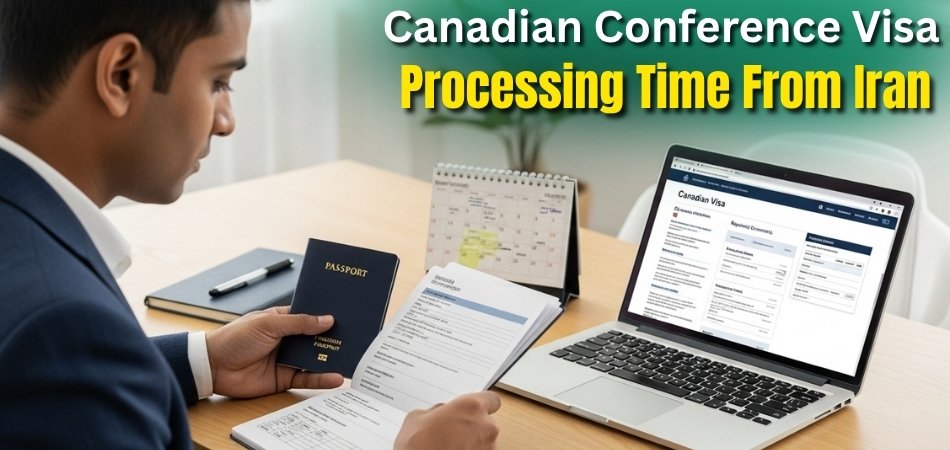Canada continues to be a top destination for international conferences, attracting researchers, students, and professionals from Iran each year. These events open doors to knowledge-sharing, networking, and career growth. But before planning travel, understanding the visa processing timeline is one of the most critical steps.
On average, the Canadian Conference Visa Processing Time from Iran takes about 146 days. This means applicants must prepare well in advance to meet deadlines. Factors like biometrics, background checks, and embassy workload can cause variations, but knowing the average time frame helps set realistic expectations.
For Iranian applicants, applying early is essential to avoid missing an important conference. In this guide, we’ll explain the processing timeline in detail, discuss factors that influence delays, and share practical tips to ensure a smoother experience with your Canadian conference visa application.
Canadian Conference Visa Processing Time From Iran
Applying for a Canadian conference visa from Iran requires careful planning because the process takes considerably longer compared to some other countries. The average processing time is around 146 days, which equals nearly five months. Understanding this timeline helps applicants prepare early, avoid last-minute stress, and increase their chances of attending the event on time. Here are the main details Iranian applicants should know:
Average Time Frame
For most applicants from Iran, the processing time is about 146 days. This estimate includes the time it takes for IRCC to review applications, complete background checks, and process biometrics. Because this is only an average, some applicants may experience shorter or longer waits.
Variations Based on Season
The time frame can vary depending on the season. Applications submitted during peak conference months or academic seasons often face higher volumes, which may slow down approvals. Submitting documents well in advance ensures you have enough buffer before your travel date.
Biometrics and Appointments
All Iranian applicants are required to provide biometrics, which adds extra steps to the process. Scheduling and attending biometrics appointments may delay the timeline, especially if appointment slots are limited. It is advisable to complete this step quickly after receiving instructions.
Security and Background Checks
Due to regional requirements, applications from Iran may undergo additional scrutiny. Security checks and background reviews can take longer compared to other nationalities. While these checks are routine, they often extend the total processing time beyond the standard average.
Embassy and VFS Global Role
Since Canada does not operate a visa office directly inside Iran, applicants must rely on VFS Global in neighboring countries to handle submissions and biometrics. This adds logistical challenges, including extra time for scheduling and transferring documents between offices.
Impact of Incomplete Applications
Even small mistakes, such as missing documents or unclear information, can cause significant delays. IRCC often requests additional information before proceeding, which adds weeks to the total time. Double-checking all forms and requirements before submission reduces this risk.
Political and Administrative Factors
In some cases, political relations and administrative processes may impact timelines. While IRCC maintains standard procedures, external factors occasionally slow down communication or add layers of verification, making it even more important for Iranian applicants to plan early.
Importance of Early Application
Given the long processing period, Iranian applicants should apply at least six months before the planned conference date. This is especially true for those attending a Canada conference with invitation letter, as having an official invitation strengthens the application and supports timely approval.
Using Tracking Tools
Applicants can monitor their visa progress through the IRCC online portal or the VFS Global tracking system. While tracking does not speed up the process, it helps applicants stay informed about their file status and respond quickly to any requests from IRCC.
Preparing for Unexpected Delays
Even with careful planning, delays can still happen. Applicants should avoid booking non-refundable tickets before receiving visa approval. Staying flexible with travel arrangements ensures you don’t face financial loss if your application takes longer than expected.
Factors That Impact Canadian Conference Visa Processing Time from Iran
While the average processing time is around 146 days, not every application follows the same timeline. Several factors can either speed up or delay the process, and understanding these helps Iranian applicants prepare better and avoid unnecessary setbacks. Below are the main factors that influence the timeline.
Volume of Applications
When IRCC and VFS Global receive a surge of visa applications, especially during peak conference or academic seasons, processing naturally slows down. Higher volumes mean longer queues for both document review and biometrics scheduling.
Completeness of Documents
Incomplete applications are one of the biggest causes of delays. Missing financial statements, unclear conference invitation letters, or errors in forms often lead IRCC to request additional documents. Each request adds several weeks to the total processing time.
Biometrics Scheduling
Since applicants from Iran must travel to VFS Global centers in neighboring countries for biometrics, scheduling can sometimes take weeks. Any delay in securing an appointment directly affects how quickly the overall application is processed.
Security and Background Checks
Applications from Iran often undergo detailed security and background reviews. These checks are routine but can take extra time due to the need for cross-verification. If additional clarifications are required, this step can significantly extend the process.
Seasonal and Operational Factors
The time of year matters. Around major academic sessions or global conferences, IRCC offices typically experience heavier workloads. At the same time, embassy or service disruptions, holidays, or administrative delays can extend waiting periods further.
Political and External Conditions
Geopolitical circumstances sometimes influence processing timelines indirectly. While IRCC applies uniform standards globally, applicants from certain regions may face lengthier verifications. This makes early application crucial for those traveling from Iran.
Processing Time in Practice: Iran-Specific Challenges
For Iranian applicants, the Canadian conference visa process comes with unique hurdles that often extend the average 146-day timeline. These challenges are not always obvious but can significantly impact travel plans if not accounted for. Below are the key issues applicants from Iran typically face.
No Direct Visa Office in Iran
Canada does not operate a visa office inside Iran, meaning applicants must rely on VFS Global centers in neighboring countries such as Turkey or the UAE. This adds travel, scheduling, and logistical challenges, which naturally lengthen the overall process.
Limited Biometrics Availability
Biometric collection is mandatory for all Iranian applicants, but the number of available appointments in nearby countries is limited. During busy periods, securing a slot can take weeks, adding more waiting time before the actual application review even begins.
Political and Administrative Layers
Applications from Iran often go through additional administrative processing due to political considerations. These layers may include extended security reviews or more thorough document checks, which can significantly increase the total waiting time compared to applicants from other regions.
Higher Demand from Academic Applicants
Iran has a large number of academics, researchers, and students applying to attend international conferences in Canada. This high demand results in heavier loads for visa offices processing Iranian files, leading to longer queues and extended processing times.
Travel Barriers for Submission
Since applicants cannot submit documents or attend biometrics within Iran, traveling abroad for these steps introduces extra costs and delays. These additional expenses often add to the overall Canadian conference attendance cost from Iran, making early planning even more important for applicants.
Communication Challenges
Language barriers and time zone differences sometimes cause miscommunication or delayed responses between applicants and VFS or IRCC. Even small delays in clarifying requested documents can push back processing by weeks, which is particularly critical with tight conference deadlines.
How Can Iranian Applicants Track Their Visa?
Once a Canadian conference visa application is submitted, the long waiting period can feel stressful. For applicants from Iran, tracking the progress becomes essential to stay updated and respond quickly to any requests from IRCC. Here are the main ways to check your status.
IRCC Online Portal
All applicants are required to create an IRCC account when submitting their visa application. This account provides real-time updates on the file, including when documents are received, when biometrics are recorded, and when decisions are made. Checking the portal regularly helps applicants avoid missing critical updates.
VFS Global Tracking System
Since Iranian applicants must use VFS Global centers in neighboring countries, they also receive a tracking number upon submission. This number can be used on the VFS website to monitor the movement of documents, ensuring applicants know when their application is forwarded to IRCC or returned after processing.
Email and SMS Notifications
Applicants can sign up for email or SMS notifications during the application process. These alerts provide instant updates about key steps, such as biometric confirmation or decision readiness. For Iranian applicants traveling abroad for biometrics, SMS updates are particularly useful in avoiding missed communications.
Direct Follow-Up with VFS Global
If there are delays or confusion, applicants can contact the VFS Global center where they submitted their biometrics. While they cannot speed up processing, these centers can confirm whether documents were sent correctly to IRCC and clarify if additional steps are pending.
Monitoring Processing Times on the IRCC Website
IRCC updates estimated processing times by country, including Iran. Applicants should review these estimates regularly to know if delays are part of general backlogs or specific to their case. This transparency allows them to plan travel and conference participation more realistically.
What to Do If Processing Takes Longer Than Expected?
For Iranian applicants, even after waiting the average 146 days, there’s always a chance that the process may take longer than expected. These delays are among the common challenges in getting a Canadian Visa, and knowing how to respond can make a big difference. In such cases, the first step is to contact VFS Global to confirm that your documents have been properly transferred to IRCC.
At the same time, it’s important to check your IRCC account frequently. Many delays happen simply because applicants miss requests for additional documents or clarifications. Responding promptly keeps your application moving forward and prevents further extensions. If your case has passed the average timeline, you can also submit a web form inquiry to IRCC asking for a status update. This official step ensures that your application hasn’t been overlooked.
If delays continue to threaten your ability to attend the event, reaching out to the conference organizer can help. Organizers sometimes send supporting letters to embassies confirming your role in the event, which can strengthen your case. However, it’s also wise to prepare backup plans. If attending in person seems unlikely, consider participating virtually or requesting a deferral to a future edition.
Tips to Avoid Delays for Iranian Applicants
The average Canadian conference visa processing time from Iran is already long, at around 146 days. However, applicants can take smart steps to minimize the risks of further delays. By preparing carefully and responding quickly, you can keep your application moving smoothly. Here are some helpful tips:
- Apply Early: Submit your application at least six months before the conference. With an average 146-day processing time, early action ensures you have enough buffer for biometrics, reviews, and possible administrative delays.
- Ensure Completeness: Carefully check all forms and documents, including the invitation letter, proof of funds, and identity papers. Incomplete applications often lead to requests for more details, adding weeks to the total visa processing time.
- Book Biometrics Promptly: After receiving the Biometric Instruction Letter, schedule your appointment right away. Biometrics must be completed outside Iran, and waiting too long to book an appointment can easily push your visa approval back by weeks.
- Provide Clear Documents: Submitting documents that are unclear or missing details often causes extra verification. Ensure your bank statements, travel itineraries, and supporting papers are translated, up-to-date, and easy for IRCC officers to assess without delays.
- Stay Updated: Visa requirements sometimes change, and applicants from Iran may face unique conditions. Always review the IRCC and VFS Global websites before applying to confirm you are submitting according to the most recent guidelines.
- Strengthen Invitation Letter: A strong, official invitation letter adds credibility to your application. Make sure it clearly mentions your name, purpose, role in the conference, and event details. This reduces the chance of IRCC questioning your travel intent.
- Respond Quickly: If IRCC requests extra documents or clarification, provide them as soon as possible. Every day of delay in responding can extend the total processing time significantly and risk your visa being approved too late.
- Avoid Early Bookings: Do not make non-refundable travel arrangements before approval. With long timelines and possible delays, booking flights or hotels too soon may result in financial loss if your visa is not ready in time.
Frequently Asked Questions
Visa applicants from Iran often have specific concerns about timelines, documents, and delays when applying for a Canadian conference visa. To help clear common doubts, here are answers to some of the most frequently asked questions about the process and what to expect.
How Long Does It Usually Take to Process a Canadian Conference Visa From Iran?
The average processing time is around 146 days, which is nearly five months. This includes biometrics, background checks, and document verification. Timelines may vary depending on workload, season, and completeness of your application, so applying early is strongly recommended.
Can the Visa Processing Time Be Shortened for Iranian Applicants?
There is no official fast-track option for conference visas from Iran. However, urgent cases may sometimes be considered if supported by the conference organizer. The best way to avoid delays is to apply well in advance and provide all documents correctly.
Why Does It Take Longer for Iranian Applicants Compared to Some Other Countries?
Applications from Iran often go through extra administrative and security checks. Since Canada has no visa office inside Iran, applicants must also use VFS Global in nearby countries, adding travel and processing steps that increase the total time required.
When Should I Apply if My Conference is Six Months Away?
It is advisable to apply as soon as possible, ideally at least six months before your event. Since the average time is 146 days, applying early ensures you have enough buffer in case of unexpected delays or additional document requests.
How Do I Track My Application Once It is Submitted?
You can track your visa progress through your IRCC online account, which provides updates on file movement and decisions. Additionally, VFS Global gives a tracking number to monitor your documents. Email and SMS notifications are also available to keep you updated.
What Happens if My Visa is Not Approved Before the Conference Date?
If your visa is delayed and you cannot travel, you should inform the conference organizer immediately. Some events allow virtual participation or may offer deferrals for future editions. Unfortunately, IRCC does not expedite applications based solely on event dates.
Does a Previous Visa Refusal Affect Processing Time?
A past refusal does not automatically extend processing time, but it may lead to stricter scrutiny of your application. To avoid delays, address any issues from the previous refusal, provide strong supporting documents, and clearly state the purpose of your travel.
Do Iranian Applicants Need Biometrics Every Time?
Yes, biometrics are mandatory for Iranian applicants unless you have already provided them in the past ten years for another Canadian visa. If still valid, they can be reused, potentially saving time in the overall process.
Can Conference Organizers Help Reduce Processing Time?
Organizers cannot change IRCC timelines, but they can provide strong invitation letters and, in urgent cases, communicate with embassies to confirm your participation. This can help clarify your travel intent, but it does not guarantee faster approval.
Should I book my tickets before visa approval?
It is not recommended to book non-refundable tickets before your visa is approved. Delays are common, and booking too early can lead to financial loss. Instead, wait until you receive confirmation or choose refundable travel options.
Final Note
For applicants in Iran, the Canadian conference visa processing time from iran can feel long, averaging about 146 days. That’s why applying early is the safest way to make sure you don’t miss your chance to attend an important event.
Delays can happen due to biometrics, background checks, or busy seasons, but staying organized and checking updates regularly helps reduce uncertainty. Responding quickly to any requests from IRCC also keeps your application moving forward without unnecessary pauses.
Eventually, success comes down to preparation. By planning well in advance and giving yourself enough time, you can focus on your conference goals in Canada with peace of mind instead of worrying about your visa.








